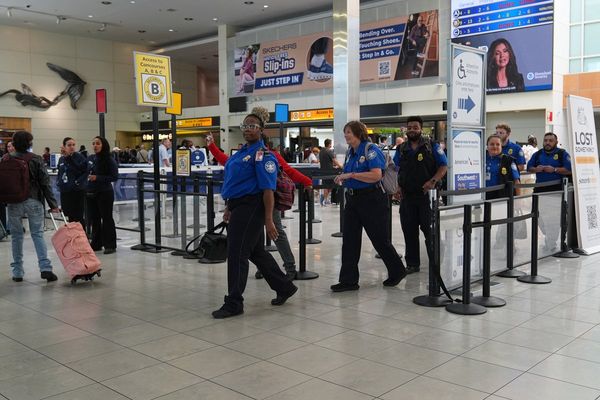Spirit Airlines said late Wednesday that it will delay until July 8 a shareholder vote on a planned merger with fellow ultra-low-cost carrier Frontier that had been set for Thursday.
Spirit said it wanted more time to continue talks with Frontier and rival suitor JetBlue.
SAVE stock rose nearly 2% in overnight trading. Frontier climbed 2%, while JBLU stock fell almost 2%.
During the day, Airline stocks were mixed in stock market trading. Spirit Airlines stock finished 1.8% lower to 22.41. Frontier stock rose 1% to 9.51. JetBlue climbed 2.6% to 8.96.
Spirit's announcement late Wednesday marked the second time the carrier has pushed back the vote. And it follows an increasingly heated back-and-forth bidding fight between JetBlue and Spirit, who have both recently sweetened their offers. But there are questions over whether regulators, under a more resistant Biden administration, would approve either deal.
"We compliment the Spirit Board for listening to their shareholders, who clearly were not supportive of the Frontier transaction, and adjourning the Special Meeting," JetBlue said in a statement late Wednesday.
The carrier added: "It's clear that Spirit shareholders have now handed the Spirit Board an undeniable mandate to reach an agreement with JetBlue."
Airline stocks analysts say the friction between the three airlines has few comparisons in the industry's modern, already-consolidated form. JetBlue, — which some say has limited prospects for organic growth, and which made an unsuccessful bid for Virgin America in 2016 — has accused Spirit's board of being too closely tied to Frontier's controlling shareholder and of "poor corporate governance." Frontier has said JetBlue has attacked Spirit's board with "a thesaurus-rich tapestry of pejoratives."
"At least certainly in the modern airline industry, it rivals some of the drama you see on 'Real Housewives' programs," said Henry Harteveldt, an analyst at Atmosphere Research Group.
Prices Go Up No Matter What
Prior to its announcement late Wednesday, Spirit's board had thrown its support behind the offer from Frontier. Any deal, if cleared, would create a much larger low-cost airline. That airline would likely have more staff, planes and slots at airports to go up against the four major U.S. airlines: Delta Air Lines, American Airlines, United Airlines and Southwest.
A tie-up could also bring more of what airline stocks investors like. That is, more restraint on expansion and a playing field with fewer competitors overall.
But any deal would come as airlines run up against thin staffing, higher fuel costs, flight cancellations and lawmaker scrutiny. And there are questions over whether either deal would actually lower prices and improve service for consumers.
"Regardless of who Spirit combines with, airfares will go up," Harteveldt said. "That is because once you take two airlines and combine them into one, you simply have that much less direct competition."
Deal Terms
Frontier's most recent offer for Spirit, announced on Friday, would give Spirit shareholders $4.13 per share in cash, up $2 from its previous offer, as well as 1.9126 shares of Frontier. That was equal to $22.27 as of Wednesday's close. SAVE stock closed slightly above that offer price.
Frontier also boosted its breakup fee to $350 million, payable to Spirit "in the unlikely event the combination is not consummated for antitrust reasons," Spirit Airlines said in a release.
Meanwhile, JetBlue, on Monday, raised its breakup fee to $400 million. The airline also hiked its prepayment fee to $2.50 per share, structured as a cash dividend to Spirit shareholders. It said its total offer amounted "up to $34.15 per share," when factoring in new monthly per-share payments to shareholders.
Frontier and Spirit first agreed to merge in February. But the drama intensified in April, when JetBlue made its own offer to acquire Spirit. A handful of juicier offers from JetBlue followed. And while Spirit, on June 8, postponed its special shareholder meeting to June 30 to entertain offers from both suitors, it has ultimately stood by the plans with Frontier.
Spirit has argued that regulators are likelier to clear a deal with Frontier, given that the Justice Department has already sued to block a pact in the Northeast between JetBlue and American. The DOJ has called that arrangement anticompetitive.
The 'JetBlue Effect' On Airline Stocks
JetBlue has agreed to offload some assets to push the deal through the regulatory process. In April, it described a combination with Spirit as "the most compelling national low-fare challenger to the four large dominant U.S. carriers by accelerating JetBlue's growth and expanding the reach of the 'JetBlue Effect.'"
That effect, JetBlue said, occurred when it entered a new market and forced the big four airlines to lower airfares more than they would upon the entry of an ultra-low-cost carrier. JetBlue has also argued that a deal with Frontier carries similar regulatory risk.
"Spirit controls a lot of aircraft and has a large team that can be absorbed into JetBlue," Helane Becker, an airline stocks analyst at Cowen, said in a brief email. "It solves an aircraft and pilot shortage."
Other airline stocks analysts have cast more doubt on JetBlue's bid for Spirit.
"JBLU is describing its offer as 'unambiguously a superior proposal' to Frontier's, but we're not so sure," CFRA analyst Colin Scarola wrote in a research note this month. "That would certainly be true if the deal closed within a few months. But 18-24 months is a more realistic time frame, and it's not abundantly clear to us Spirit can independently meet its financial commitments for that long."
"Spirit needs some near-term relief from its over-indebtedness and overcommitted position on flight equipment purchases, in our view," he added. "The JBLU offer won't provide that, but Frontier's can, in our view, making it likely Spirit shareholders opt for the Frontier offer."
Spirit had long-term debt of around $3.2 billion as of March 31.
Lawmaker Scrutiny Of Airline Stocks
Still, lawmakers have worried that a deal between Spirit and Frontier would push prices higher as well.
In a letter in March to the Justice Department and Transportation Secretary Pete Buttigieg, lawmakers — including Sens. Elizabeth Warren and Bernie Sanders, along with Reps. Alexandria Ocasio-Cortez and Rashida Tlaib — expressed concern that a deal between Spirit and Frontier would push fares higher.
"For decades, the airline industry has been plagued by increasing consolidation, producing massive airline giants while leaving consumers and workers behind," they said.
Any deal would arrive as airfares rise and airlines struggle to stay staffed — partly a product of the pandemic and airlines' efforts to steer pilots toward voluntary departures in 2020. However, airlines have remained upbeat on travel demand.
Some Democratic lawmakers, however, have grown more suspicious.
In a letter to Buttigieg on Tuesday, Sanders cited allegations from American Airlines' pilots union that "airlines are intentionally scheduling flights they can't staff due to a pilot shortage." Sens. Edward Markey and Richard Blumenthal, in a separate letter to U.S. airlines on Tuesday, claimed that many flight delays this year were "apparently due to circumstances within the airlines' control."
More drama among airline stocks could follow the Spirit shareholder vote — whenever it ends up happening.
"If the shareholders reject the Frontier offer, does Spirit sit down with JetBlue tomorrow or soon thereafter to start discussions about a merger, or do they rebuff the JetBlue offer?" Harteveldt said. "And does this become, you know, an even more hostile proposed combination?"







